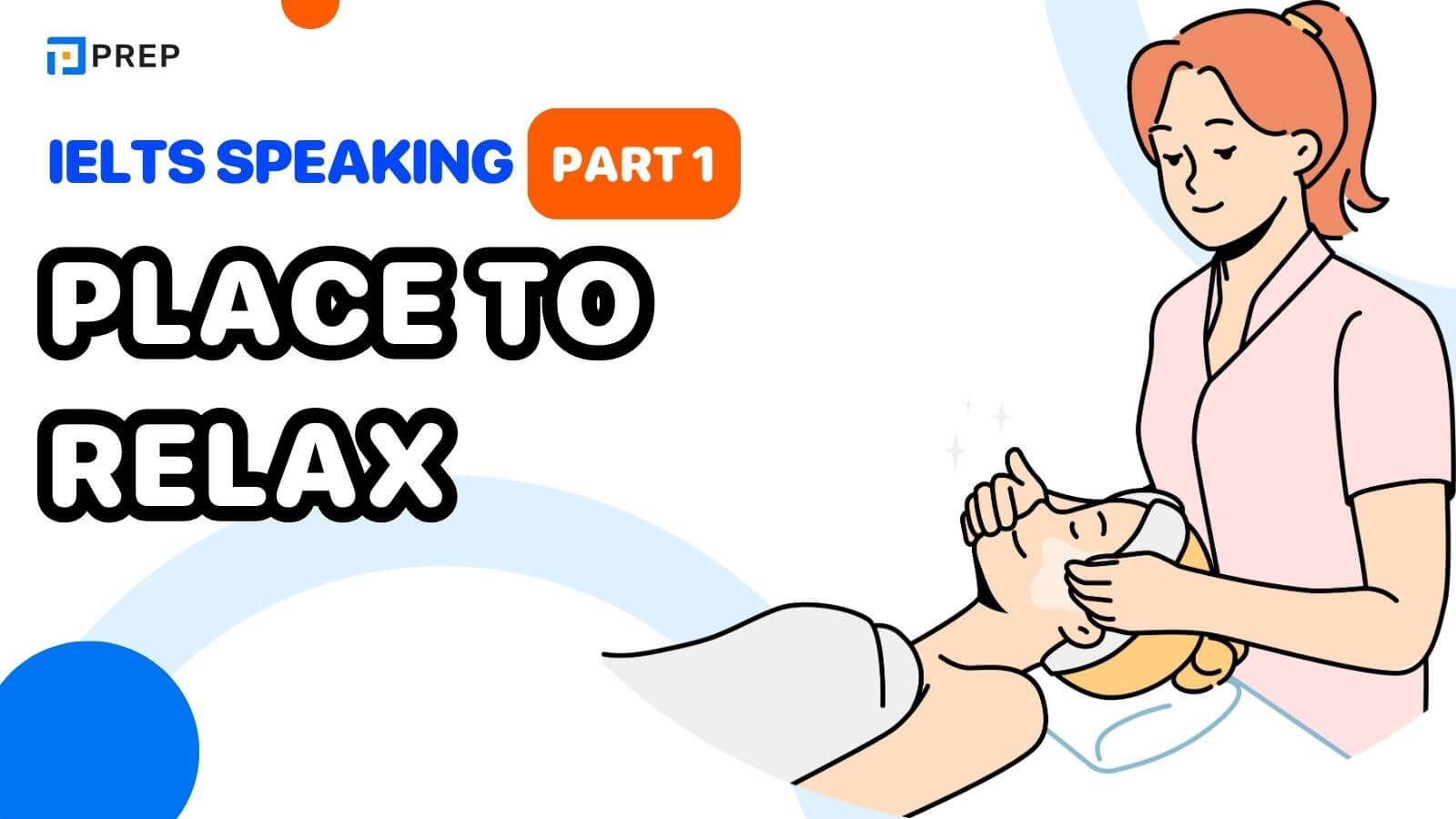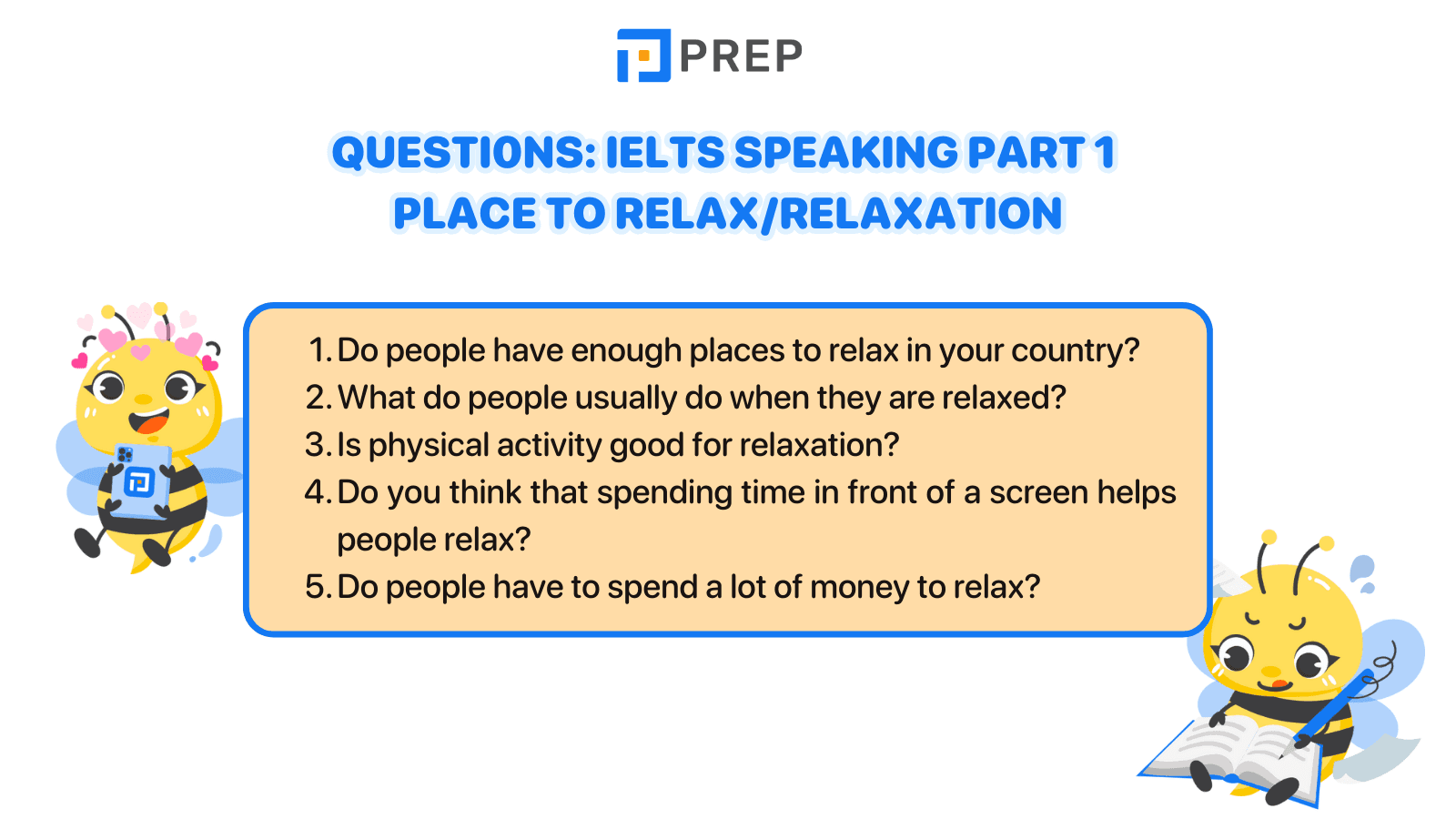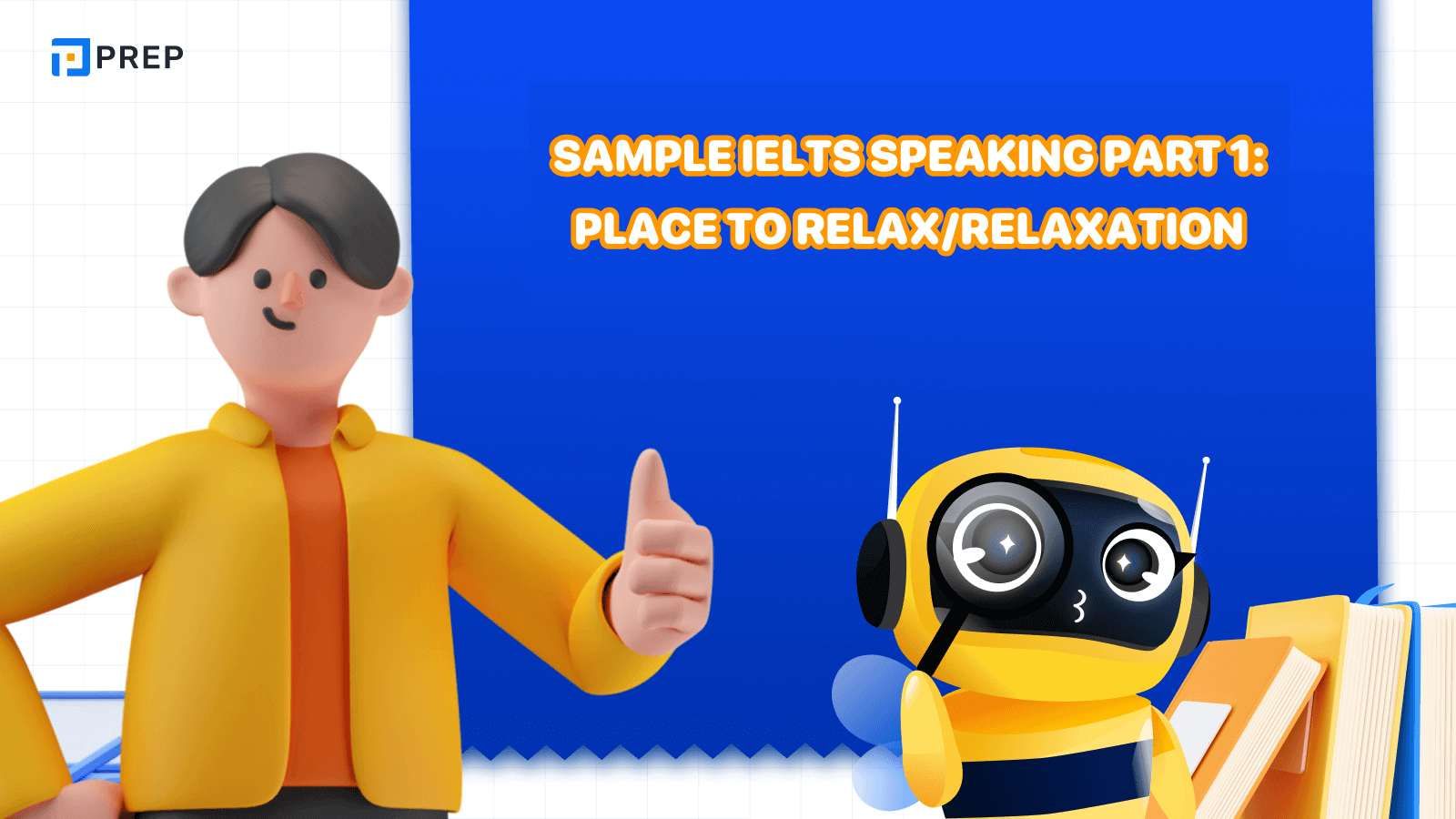Sample IELTS Speaking Part 1 Place to relax/Relaxation
Place to relax/Relaxation is a topic that frequently appears in actual IELTS Speaking tests. In today’s article, PREP would like to share a list of questions, sample answers, and useful vocabulary that you can apply in IELTS Speaking Part 1 Place to relax/Relaxation.
*This sample was prepared by Mr. Nhat Pham, an IELTS 8.5 Overall achiever (9.0 Listening, 9.0 Reading, 8.0 Writing, 7.5 Speaking) and Marker Leader at PREP.

I. Sample questions IELTS Speaking Part 1 Place to Relax/Relaxation
PREP has collected and compiled some sample questions IELTS Speaking Part 1 Place to relax/Relaxation from actual IELTS tests below. Be sure to check them out!
-
Do people have enough places to relax in your country?
-
What do people usually do when they are relaxed?
-
Is physical activity good for relaxation?
-
Do you think that spending time in front of a screen helps people relax?
-
Do people have to spend a lot of money to relax?

II. Sample IELTS Speaking Part 1 Place to relax/ Relaxation

Let’s quickly explore the sample answers for IELTS Speaking Part 1 Place to relax/Relaxation with PREP!
1. Do people have enough places to relax in your country?
In Vietnam, the availability of leisure spaces is quite extensive, however, the quality of these places varies. Urban parks and recreational areas offer tranquility, but they are often crowded because we need more of them in big cities/metropolitan areas. In contrast, serene natural spots such as Ha Giang or Sapa - the majestic northern uplands, or Da Lat plateau are becoming go-to places for many urban residents.
High-scoring vocabulary for sample answers in IELTS Speaking Part 1 Place to relax/Relaxation:
-
Availability (n): The state of being accessible or obtainable; the readiness for use or service.
-
Extensive (adj): Covering a large area; having a wide range or scope; significant in scale.
-
Metropolitan areas (n): Large urban regions that include major cities and surrounding suburbs or neighborhoods.
-
Majestic (adj): Having grandeur or beauty; impressive and splendid, often related to natural landscapes or architecture.
-
Go-to places (n): Locations frequently visited or chosen as preferred destinations due to convenience, quality, or popularity.
2. What do people usually do when they are relaxed?
When people seek relaxation, they commonly engage in activities that alleviate stress. Reading, for instance, transports individuals to different worlds, providing mental escapism. Similarly, engaging in hobbies such as gardening or painting fosters a sense of accomplishment, promoting a relaxed state of mind.
High-scoring vocabulary for sample answers in IELTS Speaking Part 1 Place to relax/Relaxation:
-
Escapism (n): The tendency to seek distraction or relief from unpleasant realities, often through entertainment or fantasy.
-
Alleviate (v): To make something less severe or more bearable; to reduce or lessen.
-
Accomplishment (n): An achievement or completion of a task, often signifying success or fulfillment.
3. ls physical activity good for relaxation?
Oh of course yes, physical activity plays a pivotal role in helping people to unwind. Exercise not only contributes to physical well-being but also releases endorphins, promoting a sense of euphoria. Whether it's a brisk walk or a vigorous workout, the positive impact on both the body and mind is undeniable, making it a highly effective means of unwinding.
High-scoring vocabulary for sample answers in IELTS Speaking Part 1 Place to relax/Relaxation:
-
Pivotal (adj): Of crucial importance; central to the development or success of something.
-
Endorphins (n): Hormones that are often associated with feelings of happiness and pain relief; natural chemicals in the body that promote well-being.
-
Euphoria (n): A state of intense happiness or excitement; an overwhelming feeling of joy.
-
Vigorous (adj): Strong, energetic, and active; involving physical strength or effort.
4. Do you think that spending time in front of a screen helps people relax?
I kinda doubt it, while screens offer various forms of entertainment, their role in this is debatable. Excessive screen time, especially before bedtime, can disrupt sleep patterns, leading to heightened stress levels. On the other hand, mindful consumption of soothing content, such as nature documentaries or calming music, can contribute positively to relaxation, so I guess striking a balance is crucial.
High-scoring vocabulary for sample answers in IELTS Speaking Part 1 Place to relax/Relaxation:
-
Debatable (adj): Open to discussion or argument; subject to differing opinions.
-
Excessive (adj): More than is necessary, normal, or desirable; overly abundant.
-
Consumption (n): The act of using up resources or goods; the process of consuming or using something.
-
Balance (n): A state of equilibrium; stability; (v) to make something equal in amount, importance, or effect.
5. Do people have to spend a lot of money to relax?
Well, actually not. Contrary to popular belief, relaxation doesn't always equate to extravagant spending. Many low-cost or free activities can be equally rejuvenating. A simple stroll in the park, meditation, or spending quality time with loved ones can be profoundly relaxing without the need for a substantial financial investment. It's more about the quality of the experience than the amount spent.
High-scoring vocabulary for sample answers in IELTS Speaking Part 1 Place to relax/Relaxation:
-
Equate (v): To consider one thing to be the same as another; to balance or make equal.
-
Extravagant (adj): Characterized by excessive spending or lavishness; overly elaborate or wasteful.
-
Rejuvenating (adj): Having the effect of making someone or something feel or look younger, fresher, or more lively.
-
Meditation (n): The practice of focusing the mind for a period of time for relaxation, contemplation, or spiritual purposes.
-
Substantial (adj): Of considerable importance, size, or worth; significant or meaningful.
In this article, PREP has provided you with comprehensive sample answers for IELTS Speaking Part 1 Place to relax/Relaxation. Be sure to follow PREP regularly for more quality English language knowledge!
In PREP's IELTS Speaking course, you'll receive comprehensive pronunciation training, supported by advanced AI technology that evaluates your pronunciation exercises and provides detailed corrections. The highlight is access to the premium Prep AI Virtual Speaking Room, where you can build confidence and reflexes for real test scenarios while receiving swift, detailed feedback with 95% accuracy compared to actual exams.
Download the PREP app to study IELTS effectively at home with a high-quality online learning program designed to help you achieve outstanding scores.

Hi I'm Chloe, and I am currently serving as an Product Content Administrator at Prep Education. With over five years of experience in independent online IELTS study and exam preparation, I am confident in my ability to support learners in achieving their highest possible scores.











